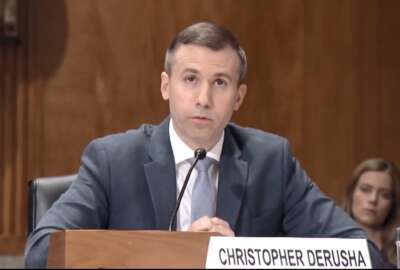Best listening experience is on Chrome, Firefox or Safari. Subscribe to Federal Drive’s daily audio interviews on Apple Podcasts or PodcastOne.
- A lack of clarity about who is in charge of what has the Army making mistakes on ammunition procurement. In one case they bought a $2.8 million piece of equipment that didn’t perform its required job. A Government Accountability Office report said the Army needs to revise its governing documents. The Agreement between the Joint Munitions Command, and Joint Program Executive Office, Armaments and Ammunition has not changed since 2004 even though the responsibilities have changed and the Army Futures Command now takes part in the procurement process.
- The IRS faces major management and performance challenges in the year ahead. The Treasury Inspector General for Tax Administration found the IRS, as of this August, still has 14 million paper tax returns it needs to process. IRS Commissioner Chuck Rettig said the agency will get to a healthy state with its backlog by the end of the calendar year. Meanwhile, TIGTA said the IRS should anticipate increased employee misconduct allegations as it looks to significantly increase hiring over the next 10 years. The recently passed Inflation Reduction Act gives the agency $80 billion to rebuild its workforce over that period of time.
- A group of teachers is going toe-to-toe with the Defense Department. It’s 570 teachers in the Department of Defense Education Activity (DODEA) schools in Italy, Spain, Turkey and Bahrain. They are trying to get their first new labor agreement in 28 years. Union President Linda Hogan, who is in D.C. this week for talks, said it took a letter from members of the House Armed Services Committee to get the agency to speed up the year-long negotiations. Hogan said DODEA has been trying to take back teachers’ class preparation and lunch time.
- The Navy has picked a site for a proposed National Museum of the U.S. Navy. Officials want to build the facility just outside the Washington Navy Yard in southeast D.C. To build on that site, the Navy would need to buy, condemn or trade other land for the six-acre parcel just northwest of the Yard. In a draft environmental impact statement, the Navy said taking over that real estate would also solve security concerns by reducing the encroachment of private development near the sensitive site. Officials said they are worried about the potential of “visual surveillance and acoustic and electronic eavesdropping” if a planned private development moves forward on that same parcel.
- White House cyber leaders hope to show agencies the money to fund major cybersecurity improvements. Agencies are currently building their fiscal 2024 budget requests, and Federal Chief Information Security Officer Chris DeRusha said the White House’s zero trust strategy is helping drive necessary cybersecurity investments across government. The Biden administration’s 2023 budget already included a 10% increase in cybersecurity spending, and DeRusha wants to go further. “I’m just trying to see if we can keep building off that success by being compelling, and showing with data, the need for these investments, because you know, that’s what’s been missing from it,” DeRusha said. (Federal News Network)
- New data from the Office of Management and Budget is showing federal cybersecurity is making important progress. Agencies faced more than 32,500 cyber incidents in fiscal 2021, a 6% increase over 2020. At the same time, the annual Federal Information Security Management Act report to Congress showed agencies have met many of the basic cyber hygiene requirements for the first time. OMB said 77 agencies received a rating of “managing risk,” up from 33 in 2017. No agency received a “high risk” rating for the second year in a row. Meanwhile, OMB said agency IG reviews found 55 agencies have cybersecurity programs considered “effective,” which is up from 52 last year and 39 in 2017.
- The small business contract known as Polaris is facing its first protest. Three companies have filed complaints with the Court of Federal Claims. MicroTechnologies, SH Synergy and VCH Partners submitted pre-award protests about how GSA is conducting evaluations of mentor-protégé relationships. This is the second time Polaris has faced challenges over this issue. The first time caused GSA to pause the Polaris program for more than a month.
- Time is running out for federal employees to apply for a temporary Public Service Loan Forgiveness waiver. Federal employees have just twelve days left to submit a limited-time PSLF waiver. The temporary fix aims to broaden eligibility for the PSLF program, meant to provide debt relief to federal workers. Those looking to apply must go through all the steps using the PSLF Help Tool before the end of the month. The White House urges federal employees with student debt to get their applications in as soon as possible. The special PSLF waiver will expire on October 31.
- Out of nearly 1,200, only 465 federal leadership positions requiring Senate confirmation have so far been filled during the Biden administration. It’s taken an average of 127 days for Biden’s nominees to move through the confirmation process. That’s compared with averages of 115 days under Trump and 112 days under Obama. The Partnership for Public Service says the confirmation process has nearly tripled in length since the Reagan administration.
- The Transportation Security Administration is taking new steps to ensure critical railways are not susceptible to cyber attacks. TSA updated its cybersecurity directives for passenger and freight rail carriers this week. The agency first issued cyber requirements for all rail operators last November. TSA handed down similar cyber directives to the gas pipeline industry in the wake of last year’s Colonial Pipeline ransomware attack.
- Leaders on the House Science, Space and Technology Committee are asking the White House Office of Science and Technology Policy for specifics regarding making research available to the public. That office issued an August memo, which addressed the idea of expanding public access to federal research.
Copyright
© 2025 Federal News Network. All rights reserved. This website is not intended for users located within the European Economic Area.




